Papers by Santiago Arango Muñoz
Humanitas Hodie, 2021
La ilusión de profundidad explicativa (ipe) es uno de los fenómenos que ha despertado gran interé... more La ilusión de profundidad explicativa (ipe) es uno de los fenómenos que ha despertado gran interés en la ciencia cognitiva en los últimos veinte años. Sucede cuando la persona cree poder explicar un fenómeno mejor de lo que realmente puede explicarlo. A continuación, se hará una reconstrucción histórica de los estudios de la ipe a lo largo de las últimas décadas, dando cuenta de su actualidad e importancia. Primero se presentarán los antecedentes y los estudios fundantes de este tema de investigación. A continuación, se expondrán las investigaciones iniciales (años 2002-2015), y la manera como prosiguió la indagación con cuestionamientos y soluciones a la ipe (años 2016-2021). Finalmente, se analizará la relación entre la ipe, las fake news y el internet.

Cartografías del Pensamiento Filosófico, 2023
El objetivo de este capítulo es mostrar y evaluar cómo un debate que en su origen fue epistemológ... more El objetivo de este capítulo es mostrar y evaluar cómo un debate que en su origen fue epistemológico ha recibido influencia de una tesis metafísica, proveniente de la filosofía de la mente. En la primera parte de este capítulo identificaremos las principales corrientes que surgieron en el marco del debate sobre el internisrno y el externisrno de la justificación, esto es, grosso modo, el debate acerca de si la justificación de una creencia debe estar al alcance del sujeto (internisrno) o si esa justificación se determina independientemente de tal alcance (externisrno). Seguidamente, abordaremos este debate desde el punto de vista del fiabilisrno y la epistemología de la virtud, y finalmente presentaremos las tesis de la mente extendida y la cognición distribuida para mostrar cómo estas tesis pueden ser influyentes en las discusiones epistemológicas entre posturas internistas y externistas.
Synthese, 2021
Mind-wandering seems to be paradigmatically unintentional. However, experimental findings have yi... more Mind-wandering seems to be paradigmatically unintentional. However, experimental findings have yielded the paradoxical result that mind-wandering can also be intentional. In this paper, we first present the paradox of intentional mind-wandering and then explain intentional mind-wandering as the intentional omission to control one's own thoughts. Finally, we present the surrealist method for artistic production to illustrate how intentional omission to control thoughts can be deployed towards creative endeavors.
Mind and Language, 2019
The cognitive phenomenology thesis claims that “there is something it is like” to have cognitive ... more The cognitive phenomenology thesis claims that “there is something it is like” to have cognitive states such as believing, desiring, hoping, attending, and so on. In support of this idea, Goldman claimed that the tip‐of‐the‐tongue phenomenon can be considered as a clear‐cut instance of nonsensory cognitive phenomenology. This paper reviews Goldman's proposal and assesses whether the tip‐of‐the‐tongue and other metacognitive feelings actually constitute an instance of cognitive phenomenology. The paper will show that psychological data cast doubt on the idea that the tip‐of‐the‐tongue and other metacognitive feelings are clear‐cut instances of cognitive phenomenology.
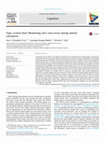
Cognition, 2016
The feeling of error (FOE) is the subjective experience that something went wrong during a reason... more The feeling of error (FOE) is the subjective experience that something went wrong during a reasoning or calculation task. The main goal of the present study was to assess the accuracy of the FOE in the context of mental mathematical calculation. We used the number bisection task (NBT) to evoke this metacognitive feeling and assessed it by asking participants if they felt they have committed an error after solving the task. In the NBT participants have to determine whether the number presented in the middle οf a triplet corresponds to the arithmetic mean of the two outer numbers (e.g., 07_16_25) with a Yes/No answer. Our results show that FOE reports were strongly correlated with arithmetic errors and numerical properties of the NBT, suggesting that the FOE accurately represents the error. This finding indicates that even very fast metacognitive feelings are reliable when it comes to evaluating one’s own mental performance. Moreover, our results suggest that the occurrence of FOEs is determined by the fluency with which each triplet was solved and the post-decision evaluation processes that occurred after the NBT was solved. Additionally, we asked participants to report their confidence in the given answer for the cases where they did not report FOEs. Participants reported less confidence for the (objectively) incorrect answers than for the (objectively) correct ones, suggesting that in cases where they did not have a conscious FOE they still were able to implicitly detect their errors. Remarkably, confidence was also determined by the fluency of the NBT.
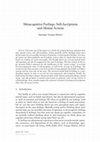
Philosophical Inquiries 2(1), 2014
The main aim of this paper is to clarify the relation between epistemic feel- ings, mental action... more The main aim of this paper is to clarify the relation between epistemic feel- ings, mental action, and self-ascription. Acting mentally and/or thinking about one’s mental states are two possible outcomes of epistemic or metacognitive feelings. Our men- tal actions are often guided by our E-feelings, such as when we check what we just saw based on a feeling of visual uncertainty; but thought about our own perceptual states and capacities can also be triggered by the same E-feelings. The first section of the pa- per presents Dokic’s argument for the insufficiency of the “ascent routine” to account for non-transparent cases of self-ascription, as well as his account of E-feelings. The second section then presents a two-level model of metacognition that builds on Dokic’s account and my own view of the issue. The two-level model links E-feelings to a min- dreading capacity in order to account for non-transparent self-ascriptions. Finally, the third section develops a deeper characterization of the relation among E-feelings, mental action, and self-ascription of mental states based on epistemic rules. In the context of self-knowledge, these remarks suggest the existence of means of forming self-ascriptions other than the ascent routine.
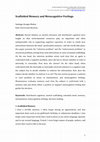
Recent debates on mental extension and distributed cognition have taught us that environmental re... more Recent debates on mental extension and distributed cognition have taught us that environmental resources play an important and often indispensable role in supporting cognitive capacities. In order to clarify how interactions between the mind –particularly memory– and the world take place, this paper will present the “selection problem” and the “endorsement problem” as structural problems arising from such interactions in cases of mental scaffolding. On the one hand, the selection problem arises each time that an agent is confronted with a cognitive problem, since she has to choose whether to solve it internally or externally: How does she choose? On the other hand, when confronted with the internally or externally retrieved solution to a cognitive task, the subject has to decide whether to endorse the information. How does the subject decide whether to endorse it or not? The last section will propose a solution to each problem in terms of metamemory and metacognitive feelings. Metamemory evaluates memory each time the subject is confronted with a memory task and elicits either a positive or negative metacognitive feeling that guides the decision.
Among the phenomena that make up the mind, cognitive psychologists and philosophers have postulat... more Among the phenomena that make up the mind, cognitive psychologists and philosophers have postulated a puzzling one that they have called “epistemic feelings”. This paper aims to 1) characterize these experiences according to their intentional content and phenomenal character, 2) describe the nature of these mental states as nonconceptual in the case of animals and infants, and as conceptual mental states in the case of adults living beings. Finally, 3) the paper will contrast three accounts of the causes and mechanisms of epistemic feelings: the doxastic account, the mental scanner and the heuristic-based account. The paper will argue in favor of the heuristic based account.

Philosophia, 2011
Two main theories about metacognition are reviewed, each of which claims to provide a better expl... more Two main theories about metacognition are reviewed, each of which claims to provide a better explanation of this phenomenon, while discrediting the other theory as inappropriate. The paper claims that in order to do justice to the complex phenomenon of metacognition, we must distinguish two levels of this capacity—each having a different structure, a different content and a different function within the cognitive architecture. It will be shown that each of the reviewed theories has been trying to explain only one of the two levels and that, consequently, the conflict between them can be dissolved. The paper characterizes the high-level as a rationalizing level where the subject uses concepts and theories to interpret her own behavior and the low-level as a controlling level where the subject exploits epistemic feelings to adjust her cognitive activities. Finally, the paper explores three kinds of interaction between the levels.
It is still unclear what metacognition is. Two main theories about metacognition are reviewed, ea... more It is still unclear what metacognition is. Two main theories about metacognition are reviewed, each of which claims to provide a better explanation of the phenomenon, while discrediting the other theory as inappropriate. My claim is that in order to do justice to the complex phenomenon of metacognition, we must distinguish two levels of this capacity. It can be shown that each of these theories has been trying to explain only one of the two levels and that, consequently, the conflict between them can be dissolved. Finally, I characterize each level and explain some of their interactions.
The text aims to defend the existence of mental actions against the recent claims of some theoris... more The text aims to defend the existence of mental actions against the recent claims of some theorists. Even if bodily and mental actions share some common features, they are two different kinds of actions. The former aims at changing the world, whereas the latter aims at changing the mind. This difference corresponds to a difference in the type of control: whereas in bodily action motor control is used, it is likely that in mental action metacognitive control is used. These differences are mirrored in the phenomenology of both kinds of actions. I will focus particularly on the case of directed remembering.
El objetivo del texto es defender la lectura metafísica del Tractatus logico- philosophicus. Así ... more El objetivo del texto es defender la lectura metafísica del Tractatus logico- philosophicus. Así pues, la primera sección expone la polémica actual en torno a la interpretación del Tractatus y asume una posición en dicha polémica. La segunda lleva a cabo un análisis de la teoría pictórica del significado expuesta en el Tractatus a la luz de las Investigaciones filosóficas. Finalmente, la tercera parte rastrea las críticas principales de las Investigaciones al Tractatus con el fin de mostrar la distancia asumida por Wittgenstein al revisar su primer texto, y así demostrar que efectivamente hay una discontinuidad en el pensamiento del autor, particularmente con respecto a la teoría pictórica del significado.
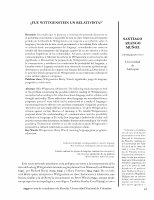
El estudio que se presenta a continuación pretende detenerse en el problema concerniente a la pos... more El estudio que se presenta a continuación pretende detenerse en el problema concerniente a la posible lectura en clave relativista del segundo período de la filosofía de Wittgenstein con respecto a su reflexión sobre el lenguaje y la relación de éste con el pensamiento y la realidad. Esta reflexión se articula desde una pragmática del lenguaje1, entendiendo esto como un estudio del funcionamiento del lenguaje a partir de su uso efectivo y de las prácticas lingüísticas de las comunidades. Así pues, nuestro estudio tendrá varios momentos: 1. Mostrar las críticas de Wittgenstein a ciertas teorías del significado; 2. Reconstruir la propuesta de Wittgenstein para comprender la comunicación y establecer las condiciones de posibilidad del lenguaje; 3. Estudiar cómo el lenguaje está unido a un sistema de creencias y prácticas que determinan y posibilitan la comprensión humana del mundo; 4. Determinar si lo anterior sitúa la propuesta de Wittgenstein en un relativismo cultural tal como señalan algunos intérpretes.
Book chapter by Santiago Arango Muñoz

Cartografías del pensamiento filosófico, 2023
Los distintos intentos por aclarar el concepto de justificación epistémica han dado lugar a los m... more Los distintos intentos por aclarar el concepto de justificación epistémica han dado lugar a los más intrincados debates en la epistemología analítica contemporánea. Da cuenta de ello la controversia entre el internisrno y el externisrno de la justificación, y las discusiones que han surgido allí entre el fiabilismo y la epistemología de la virtud. Estas disputas han tornado un nuevo aire tras el surgimiento de la tesis de la mente extendida propuesta por Clark y Chalrners (1998), que sugiere la posibilidad de conocimiento extendido más allá de la mente o el cerebro individual del sujeto. El objetivo de este capítulo es mostrar y evaluar cómo un debate que en su origen fue epistemológico ha recibido influencia de una tesis metafísica, proveniente de la filosofía de la mente. En la primera parte de este capítulo identificaremos las principales corrientes que surgieron en el marco del debate sobre el internisrno y el externisrno de la justificación, esto es, grosso modo, el debate acerca de si la justificación de una creencia debe estar al alcance del sujeto (internisrno) o si esa justificación se determina independientemente de tal alcance (externisrno). Seguidamente, abordaremos este debate desde el punto de vista del fiabilismo y la epistemología de la virtud, y finalmente presenta- remos las tesis de la mente extendida y la cognición distribuida para mostrar cómo estas tesis pueden ser influyentes en las discusiones epistemológicas entre posturas internistas y externistas.

Minimal Cooperation and Shared Agency, 2020
Our aim in this chapter is to delineate the form of shared agency that we take to be manifested i... more Our aim in this chapter is to delineate the form of shared agency that we take to be manifested in collective memory. We argue for two theses. First, we argue that, given a relatively weak conception of episodicity, certain small-scale groups display a form of emergent (i.e., genuinely collective) episodic memory, while large-scale groups, in contrast, do not display emergent episodic memory. Second, we argue that this form of emergent memory presupposes (high-level and possibly low-level) metamemorial capacities, capacities which are, however, not themselves emergent group-level features but rather strictly individual-level features. The form of shared agency that we delineate is thus revealed as being minimal in three senses. First, the relevant groups are themselves minimal in terms of their size. Second, the form of memory in question is minimally episodic. And finally, the cognitive capacities attributed to the relevant groups are minimal, in the sense that they need not themselves be capable of metacognition.

Ética animal: Fundamentos empíricos y teóricos para nuestra relación ética con otras especies animales
La metacognición puede definirse de dos formas: 1) como la capacidad metarrepresentacional de ads... more La metacognición puede definirse de dos formas: 1) como la capacidad metarrepresentacional de adscribir estados mentales a otros sujetos y a sí mismo o 2) como la capacidad de monitorear y controlar los procesos cognitivos propios. Estas dos definiciones reflejan el debate que ha habido entre dos maneras diferentes de entender esta capacidad mental; un debate con diferentes implicaciones sobre la arquitectura cognitiva, diferentes predicciones sobre los seres que poseen esta capacidad y sobre el funcionamiento de la misma. Desde el punto de vista del problema de las mentes animales, la adopción de una de estas definiciones (sea como capacidad metarrepresentacional o como monitoreo y control) determinará qué tipo de conductas cuentan como evidencia de la capacidad metacognitiva y qué animales son poseedores de esa capacidad. Así, al centrar su análisis en la definición metarrepresentacional, Peter Carruthers (2008, 2009, 2011) ha negado la presencia de metacognición en los animales no-humanos (de ahora en adelante ‘animales’); mientras que Joëlle Proust (2009b, 2012, 2013), al usar la definición en términos de monitoreo y control, ha afirmado que los animales tienen capacidades metacognitivas. Este debate, además, tiene incidencias sobre la teoría de orden superior de la conciencia ya que algunos teóricos (e.g., Gennaro (2009)) han clasificado las capacidades metacognitivas como indicios de pensamiento de orden superior y, por ende, de conciencia en algunos animales. En la primera parte de este capítulo presentaré brevemente algunos estudios empíricos que pretenden determinar la presencia de metacognición en los animales. Luego, reconstruiré y evaluaré el debate entre quienes defienden la definición metarrepresentacional y quienes defienden la definición en términos de monitoreo y control. Y finalmente pasaré a evaluar las incidencias de este debate en las teorías de orden superior de la conciencia.
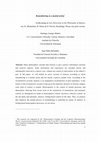
New Directions in the Philosophy of Memory (ed. K. Michaelian, D. Debus & D. Perrin). Routledge., 2018
Many philosophers consider that memory is just a passive information retention and retrieval capa... more Many philosophers consider that memory is just a passive information retention and retrieval capacity. Some information and experiences are encoded, stored, and subsequently retrieved in a passive way, without any control or intervention on the subject’s part. In this paper, we will defend an active account of memory according to which remembering is a mental action and not merely a passive mental event. According to the reconstructive account, memory is an imaginative reconstruction of past experience. A key feature of the reconstructive account is that given the imperfect character of memory outputs, some kind of control is needed. Metacognition is the control of mental processes and dispositions. Drawing from recent work on the normativity of automaticity and automatic control, we distinguish two kinds of metacognitive control: top-down, reflective control, on the one hand, and automatic, intuitive, feeling-based control on the other. Thus, we propose that whenever the mental process of remembering is controlled by means of intuitive or feeling-based metacognitive processes, it is an action.
Talks by Santiago Arango Muñoz

"La tesis de la fenomenología cognitiva afirma que hay una fenomenología particular ligada a cada... more "La tesis de la fenomenología cognitiva afirma que hay una fenomenología particular ligada a cada estado cognitivo. Para decirlo usando la expresion de Thomas Nagel: "hay algo como" ("there's something like") creer, desear, esperar, pretender, etc. Esta tesis se presenta como una crítica a la tesis más austera que afirma que sólo los estados sensoriales (tales como percibir, tener sensarios propioceptivas, tener dolores, etc) tienen fenomenología (e.g. Tye). Hace algunos años Alvin Goldman (1993) propuso que los sentimientos metacognitivos tales como el sentimiento de tener algo en la punta de la lengua (the tip of the tongue state) o el sentimiento de saber algo (the feeling of knowing) constituían ejemplos claros de phenomenología cogntiva y por lo tanto la tesis debía ser aceptada.
El presente trabajo busca evaluar la propuesta de Goldman y determinar si efectivamente los sentimientos metacognitivos constituyen una prueba de la fenomenología cognitiva. Primero reconstuiré la tesis de la fenomenología cognitva y la propuesta de Goldman. A continuación, mostraré que las teorías acerca de la metacognición y los sentimientos metacognitivos han explicado este tipo de fenómenos con independencia de la tesis de la fenomenología cognitiva. Seguidamente, mostraré que aún cuando los sentimientos metacognitivos sean experiencias fenoménicas, no se sigue que haya fenomenología cognitiva en sentido estricto. De hecho, demostraré los contrario: hay sentimientos metacognitivos porque no hay fenomenología cognitiva en la mayoría de los casos en que estos sentimientos aparecen. Por ejemplo: tenemos un sentimiento de tenerlo en la punta de la lengua no porque estemos en un estado de recolección mnemotécnica, sino porque efectivamente la recolección ha fallado. Estudios experimentales han mostrado que esta experiencia es producto de procesos heurísticos y marcadores somáticos más que una experiencia causada por el estado cognitive mismo. Conclusión: ambos fenómenos son independientes y no se puede citar uno como evidencia del otro.
"











Uploads
Papers by Santiago Arango Muñoz
Book chapter by Santiago Arango Muñoz
Talks by Santiago Arango Muñoz
El presente trabajo busca evaluar la propuesta de Goldman y determinar si efectivamente los sentimientos metacognitivos constituyen una prueba de la fenomenología cognitiva. Primero reconstuiré la tesis de la fenomenología cognitva y la propuesta de Goldman. A continuación, mostraré que las teorías acerca de la metacognición y los sentimientos metacognitivos han explicado este tipo de fenómenos con independencia de la tesis de la fenomenología cognitiva. Seguidamente, mostraré que aún cuando los sentimientos metacognitivos sean experiencias fenoménicas, no se sigue que haya fenomenología cognitiva en sentido estricto. De hecho, demostraré los contrario: hay sentimientos metacognitivos porque no hay fenomenología cognitiva en la mayoría de los casos en que estos sentimientos aparecen. Por ejemplo: tenemos un sentimiento de tenerlo en la punta de la lengua no porque estemos en un estado de recolección mnemotécnica, sino porque efectivamente la recolección ha fallado. Estudios experimentales han mostrado que esta experiencia es producto de procesos heurísticos y marcadores somáticos más que una experiencia causada por el estado cognitive mismo. Conclusión: ambos fenómenos son independientes y no se puede citar uno como evidencia del otro.
"
El presente trabajo busca evaluar la propuesta de Goldman y determinar si efectivamente los sentimientos metacognitivos constituyen una prueba de la fenomenología cognitiva. Primero reconstuiré la tesis de la fenomenología cognitva y la propuesta de Goldman. A continuación, mostraré que las teorías acerca de la metacognición y los sentimientos metacognitivos han explicado este tipo de fenómenos con independencia de la tesis de la fenomenología cognitiva. Seguidamente, mostraré que aún cuando los sentimientos metacognitivos sean experiencias fenoménicas, no se sigue que haya fenomenología cognitiva en sentido estricto. De hecho, demostraré los contrario: hay sentimientos metacognitivos porque no hay fenomenología cognitiva en la mayoría de los casos en que estos sentimientos aparecen. Por ejemplo: tenemos un sentimiento de tenerlo en la punta de la lengua no porque estemos en un estado de recolección mnemotécnica, sino porque efectivamente la recolección ha fallado. Estudios experimentales han mostrado que esta experiencia es producto de procesos heurísticos y marcadores somáticos más que una experiencia causada por el estado cognitive mismo. Conclusión: ambos fenómenos son independientes y no se puede citar uno como evidencia del otro.
"
This feeling, however, has been little studied by psychologists. To amend this lack, we have designed an experiment to test subjects’ awareness of their errors and the accuracy of such awareness. We used the “number bisection task” (NBT) to evoke and test this feeling by asking participants if they felt they have committed an error after solving the bisection task. In the NBT, the subject has to estimate whether the number in the middle is the arithmetic mean of the two other numbers (e.g., 2 4 8) by a Yes/No answer. Subjects were instructed to press the Yes/ No buttons as fast as possible (in less than 2s) and then report whether they have a feeling of error as fast as possible (in less than 2s) using again the Yes/No buttons. Each bisection problem was presented only once during the experiment, and no feedback about the correction of their answers was given to the subjects. The fast timing manipulation was done to prevent the subjects of recalculating the problems and thus to ensure that the FOE reports were based on sheer feelings and not analytical thought. In this way, we elicited metacognitive feelings and could compare actual errors in the NBT with participants’ error awareness provided by the FOE reports. Interestingly, our results about FOE error reports were strongly correlated with actual arithmetic errors; in other words, subjects reported having a FOE mainly when they had actually committed an error. Additionally, the experimenters tested subjects’ confidence in their answers when they did not report a FOE. Surprisingly, in these cases subjects reported less confidence for wrong answers than for right ones, suggesting that in cases where subjects did not have a conscious feeling they still had an implicit awareness of their errors.
This result provides support to the increasing literature on metacognitive feelings and their essential role in the mind. These feelings play an essential role in the production and explanation of mental actions (such as remembering, mentally calculating, and reasoning) by monitoring mental processes.
References:
Carruthers, P, 2009, “How we know our own minds: the relationship between mindreading and metacognition”, Behavioral and Brain Sciences, 32, 1-18.
Carruthers, P, 2012, The Opacity of the Mind: an Integrative Theory of Self-knowledge, Oxford: Oxford, University Press.
Logan & Crump, 2010, Cognitive Illusions of Authorship Reveal Hierarchical Error Detection in Skilled Typist, Science, 330, 683-686. DOI: 10.1126/science.1190483
Proust, J. 2012. Metacognition and mindreading, one or two functions. In Foundations of metacognition, ed. M. Beran, J. Brandl, J. Perner, and J. Proust, 234–251. Oxford: Oxford University Press.
"
http://metapsychology.mentalhelp.net/poc/view_doc.php?type=book&id=5574&cn=394"
https://estudiosciencia.wordpress.com/eventos-y-actividades/v-seminario-de-historia-y-filosofia-de-la-ciencia/
El Aula Abierta “Filosofía: historia, temas y problemas” es una oportunidad para escuchar a profesores del instituto de filosofía disertar sobre diversos asuntos de la historia del pensamiento. La propuesta es que nos acompañen a viajar por el tiempo y reconstruir el modo como nos hemos preguntado por el comportamiento humano individual (la ética), el comportamiento colectivo (la política), el conocimiento (la epistemología), la belleza (la estética), entre otras preguntas fundamentales de la existencia humana.
El Aula Abierta “Perspectivas sobre el conocimiento y la ciencia” abordará las siguientes preguntas: ¿Cómo y por qué llegamos a considerar científica una teoría? ¿Cuáles son los supuestos históricos, sociales y filosóficos de la actividad científica? ¿Cómo inciden estos supuestos en los resultados de la investigación, en relación con los objetivos cognitivos de la ciencia? ¿Qué impacto tiene la investigación científica sobre los contextos sociales, políticos y culturales en los que se desarrolla? ¿Qué relaciones guardan los objetivos de investigación del mundo natural con los ideales de desarrollo de las sociedades que estimulan la investigación científica? La exploración de estas preguntas y sus perspectivas de solución permiten una comprensión de las relaciones entre conocimiento, ciencia, tecnología y sociedad.
El Aula Abierta “Perspectivas sobre el conocimiento y la ciencia” constituye una base formativa para reflexionar sobre las preguntas mencionadas desde la filosofía y su relación con la historia, la antropología, la sociología, la psicología, la biología, y las ciencias cognitivas.
Las discusiones en estos tres ejes son de amplio interés para la ciudadanía, por cuanto nos permiten reflexionar sobre preguntas sobre las ciencias y el conocimiento en el contexto de los retos que enfrentan nuestras sociedades contemporáneas.
Así las cosas, el Seminario tiene un doble propósito: estimular la discusión de temas filosóficos sobre la biología, la mente y las ciencias en general que fortalece las dinámicas investigativas y, a la vez, divulgar y abrir espacios más amplios de reflexión sobre estos temas mediante la apertura del seminario al público general.
Organiza
G.I. Conocimiento, Filosofía, Ciencia, Historia y Sociedad
Instituto de Filosofía
El propósito principal del seminario es introducir a los estudiantes en las discusiones y debates fundamentales en filosofía de la mente, a través de la lectura de la obra de David Chalmers.
La filosofía de la mente nació como rama especializada de la filosofía en el siglo XX y ha tenido un desarrollo considerable, al punto de ser una de las ramas más activas e innovadoras de la filosofía contemporánea. Además, dado que la mente es la característica fundamental de lo humano, muchos filósofos y teóricos se apoyan en la filosofía de la mente para realizar reflexiones que atañen otros temas como ética, la filosofía de la ciencia, la epistemología, y la estética, entre otros.
En la actualidad la mayoría de los filósofos contemporáneos se inclinan por el materialismo, el funcionalismo o una mezcla entre los dos para responder al problema mente-cuerpo. En este contexto, la filosofía de David Chalmers sobresale por su resistencia ante estas posturas y por presentar argumentos novedosos a favor del dualismo de propiedades. Según Chalmers, el materialismo y sus variantes nunca podrán resolver el problema mente-cuerpo puesto que una mirada científica, en tanto tiende a ser más objetiva, parece alejarse de la experiencia subjetiva que es el aspecto fundamental de la mente.
Provence. I suoi primi lavori riguardano la verità logica e il suo Questions
de Forme le è valso nel 1987 la medaglia di bronzo del CNRS. Nel 1989 ha
iniziato a lavorare presso il CREA (Centre de Recherche en Epistémologie
Appliqueé) a Parigi, e si è occupata principalmente di filosofia della mente,
psicopatologia cognitiva e forme di comunicazione e cognizione sociale
negli animali non umani. Dopo aver diretto un progetto internazionale sulla
filogenesi e ontogenesi della metacognizione (ESF-Eurocore, 2006-2009),
nel 2011 ha iniziato, grazie a una borsa “advanced” dallo European
Research Council, il progetto DIVIDNORM sull’influenza della cultura nell’insorgere e nella risoluzione di conflitti tra norme epistemiche (verità,
consenso, coerenza, intelligibilità, pertinenza). Ha inoltre contribuito alla
fondazione di diverse società scientifiche, tra cui SOPHA (Société de
Philosophie Analytique), che ha presieduto dal 2000 al 2003, HOPOS (The
International Society for the History of Philosophy of Science), ESAP
(European Society for Analytic Philosophy), ed EuroSPP (European Society
for Philosophy and Psychology). Attualmente svolge la sua attività
scientifica di direttore di ricerca presso l’Institut Jean-Nicod, Ecole
Normale Supérieure.